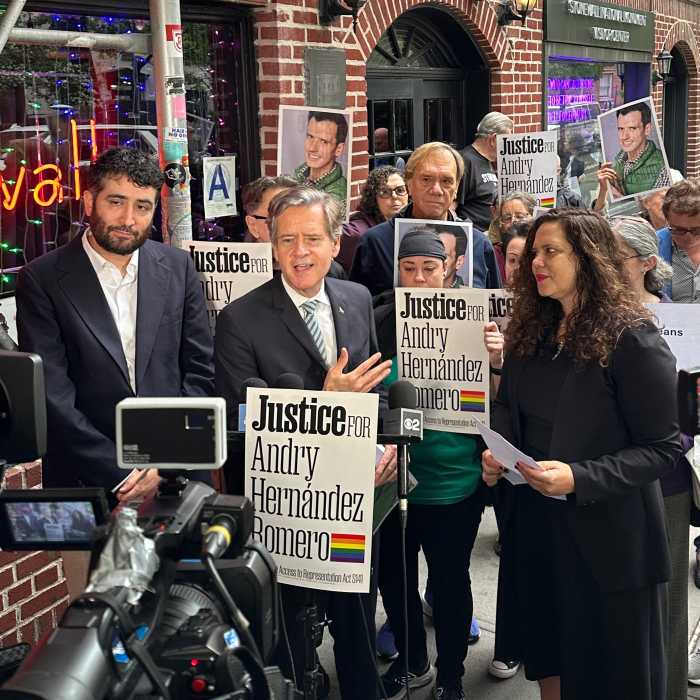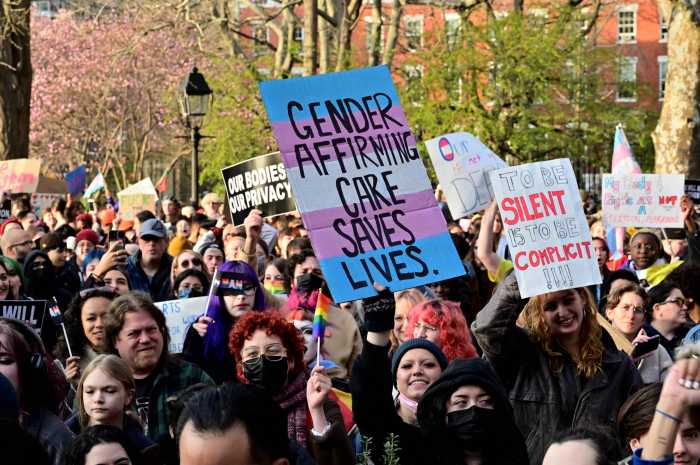BY DOUG IRELAND | Well-organized gangs of fascist thugs, numbering in the hundreds and yelling anti-gay and anti-Semitic slogans, brutally attacked the Budapest Gay Pride March on Saturday, July 5, at a number of points along the mile-long, center-city route. The miscreants threw Molotov cocktails, rocks, bottles, feces, and rotten eggs, and fought pitched battles with the police.
Twelve police officers and 32 civilians, including one journalist, were injured, while 57 arrests were made, according to a report by the Hungarian news agency MTI, which headlined its article “A Day of Shame in Budapest.”
Despite police protection, Pride marchers savaged by violent thugs.
SWAT teams in protective gear and carrying shields, called in from all over Hungary, accompanied the more than 1,000 Pride marchers the length of the route, and were frequently forced to intervene to repel the attackers.
In violence described as the worst in the 13-year history of the Pride marches, at times downtown Budapest resembled a war zone, as riot police fought hand-to-hand with the anti-gay demonstrators and used water cannons to disperse them. At one point, a mob of 500 jeering anti-gay demonstrators attacked the march and had to be repelled by the police.
It could have been much worse – deaths were avoided only because police discovered six fascists in an uninhabited upper-story apartment on Andrassy Street overlooking the Pride march route who were well-armed with a stock of Molotov cocktails and bottles containing a liquid believed to be acid. This stealth group was preparing to rain down their ammunition on the marchers below.
Some anti-gay demonstrators gathered in groups on rooftops and balconies to hurl objects at the marchers.
“There was one street where literally a shower of rotten eggs and stones was poured on us,” said Gabor Kuszing of the Hungarian gay rights group Patent. “I was lucky to have a placard in my hand to protect my head, and other people used umbrellas, but most came in their regular clothes.”
“It was great to see the police protecting us, after the police chief had tried to ban the march earlier,” Kuszing commented, adding, “The fact that the police were protecting us is an important message to the neo-Nazi criminals and the public at large.”
A police car carrying former undersecretary of state Gabor Szetey, Hungary's highest-ranking openly gay politician, and Katalin Levai, a member of the European Parliament, was attacked and a large rock smashed the car's window, although neither of the politicians – both members of Hungary's ruling Socialist Party – was injured.
Levai, a noted human rights advocate, told an on-scene reporter, “This is outrageous and shameful that some 20 years after the change of regime [from Communism], this is what we have… such intolerance.”
A police minivan was firebombed with a Molotov cocktail, and a total of 13 police cars were severely damaged in the course of the day's violence, which lasted more than three hours.
The anti-gay demonstrators eventually attacked stores and other buildings along the Pride March route with rocks and firebombs, and Budapest Mayor Gabor Demszky told reporters he estimated the damage would cost 1 billion forints (about $6.8 million), but added that the “worst damage” was to “Hungary's image in the world.”
Demszky, a member of the Alliance of Free Democrats – the party founded by veterans of the democratic dissident movement under the Communist regime, and the junior partner in the national government's Socialist-led coalition – had vigorously supported the right of the Pride March to be held after Budapest Police Chief Gabor Toth had banned it on June 11. Toth lifted the ban and authorized the march on June 15, after protests by Demszky and human rights organizations.
A scheduled post-march concert on Saturday was canceled when fascists assaulted the performers and the gathering crowd, and police had to escort the concert-goers to a nearby subway station to permit them to flee the violence.
The anti-gay violence was organized primarily by members of the fascist and xenophobic party known as Jobbik (short for “Movement for a Better Hungary”), infamous for targeting Hungary's Roma population for harassment. Jobbik has a 1,300-member militia, the Magya Garda, or Hungarian Guard, which has adopted the red-and-white flag used by the fascist Arrow Cross movement during the pro-Nazi dictatorship of Admiral Miklos Horthy more than six decades ago.
Horthy took Hungary into World War II on the side of the Nazi-led Axis powers, and his regime and the Arrow Cross helped round up at least 400,000 Hungarian Jews who were sent to the Nazi death camps, while untold thousands more were dragged out of Budapest's Jewish ghetto, shot, and dumped into the Danube River that divides the Buda and Pest sides of the Hungarian capital.
Also participating in organizing the anti-Pride violence was the 64 Counties movement, an irredentist formation that wants the return to Hungarian sovereignty of parts of Romania, Slovakia, and Serbia, which had been taken away from Hungary at the end of World War I, when the victorious Allied powers carved up the Austro-Hungarian Empire.
Many of the anti-gay demonstrators last Saturday waved the red-and-white fascist flag, or wore badges with it on their caps and clothing.
Two leading fascist agitators, Gyorgy Budahazy and Laszlo Toroczkai, made an online appeal on the fascist web site kuruc.info for “Hungarian patriots” to demonstrate against this year's Pride March, declaring, “We will not tolerate foreign perverts of whatever color forcing their alien and sick world onto Hungary.”
That same web site, in the week before the Pride March, published the addresses of gay venues, and the day after this list appeared a gay bar in Budapest, Action, was firebombed. Just three days before the Pride march, a gay sauna in Budapest was hit with four firebombs. (For more on those firebombings, see this reporter's article in July 3-9 issue of Gay City News, “Records, Repression Globally.” )
Two days after the Pride March, State Secretary Imre Ivancsik told Info Radio that the Hungarian secret services had informed Budapest police ahead of time which groups would try to disrupt the gay event. But, Ivancsik said, preventive detention was not used because it would have been “undemocratic,” and added the “best solution is to take them to court.”
The chief prosecutor of Budapest late last year brought a case to dissolve the fascist Magya Garda for “illegal activities” but that case is still pending. The leader of Jobbik, Gavor Vona, has said that if its militia is dissolved by the courts, it will reform under another name.
The governing Socialists and Free Democrats announced their solidarity with those attacked in the wake of the anti-Pride violence, and Socialist Prime Minister Ferenc Gyurcsany has called for a rally to be held on September 6 to protest extremist sentiments of hate in Hungary. The day after the Pride March, Gyurcsany met with his minister of justice and the state chief prosecutor, and asked them to deliver by July 10 a report on how well the government authorities and the police did their job in protecting the Pride marchers.
Condemnation of the anti-gay violence in Budapest was swift at the European Parliament in Strasbourg, where the multi-party Intergroup on Gay and Lesbian Rights denounced the attacks.
“I am deeply disappointed and concerned at Hungary's inability to deal with extremism,” said the Intergroup's president, European Parliament Member Michael Cashman from the British Labour Party. “This must be referred to the European Commission and the Commission's president.”
DOUG IRELAND can be reached through his blog, DIRELAND, at http://direland.typepad.com/ .


































